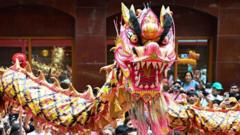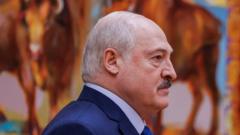As Hong Kong transitions from a world-renowned hub of activism to a glimmer of its past, former activists Kenneth and Kasumi share their emotional journeys amidst a landscape of silence and fear.
Hong Kong's Protest Legacy: A Fight to Remember

Hong Kong's Protest Legacy: A Fight to Remember
Kenneth and Kasumi reflect on how memories of Hong Kong's pro-democracy protests are fading amid Beijing's repression.
Despite the apparent vibrancy of the city, the essence of its identity is challenged as memories of rich protests and spirited demands for democracy face erasure under stringent government controls.
Hong Kong’s iconic Victoria Park once resonated with the voices of protestors demanding democracy, but now it stands as a silent witness to a changed city. Kenneth, reflecting on the memories of his past activism, feels a deep sense of loss as the vibrancy of protests and collective voices diminish. “People still carry on with life… but you can feel the change bit by bit,” he shared, speaking under a veil of anonymity. Surrounding him, the busy streets pulse with familiar activity; yet, there’s a lingering feeling that Hong Kong is losing its unique character.
The decade-long journey of protests began in 2014 with the Umbrella Movement, a call for democracy that mobilized hundreds of thousands. Yet, ultimately, it led to a fierce crackdown by the Chinese government. Kenneth recalls a time when the city's dynamic spirit was alive, suggesting that, although its surface appearance remains unchanged, the essence of activism has been stifled by a tightening grip from Beijing.
In contrast, many activists, like Chan Kin-man, have been forced into exile after facing criminal charges. Chan, who co-founded the 2014 protests, now reflects mournfully on a lost decade, filled with hopes for positive change. For Chan, the vibrant protests became increasingly impossible, leading him to teach in Taiwan while continuing to cherish the memory of a freer Hong Kong.
Meanwhile, Kasumi, a Hongkonger living in the UK, grapples with her decision to emigrate for her daughter’s future. Her emotional journey is intertwined with memories of her beloved city, painfully aware of the profound changes as she adjusts to life abroad. Each visit home leaves her grappling with a sense of nostalgia combined with disorientation amid the city's new realities.
Kasumi’s experiences resonate with Kenneth's conviction that forgetting the past equates to betrayal. Their stories reflect a shared struggle to maintain the spirit and identity of Hong Kong amid an ongoing atmosphere of surveillance and control. As Kenneth walked away from Victoria Park filled with memories, he held onto the belief that the younger generation must remember their past, indicating hope for a future in which Hong Kong’s spirit continues to endure.
As these stories unfold, the essence of the protests may be fading, but for those like Kenneth and Kasumi, the fight to remember – and redefine – what it means to be Hongkonger remains alive.
Hong Kong’s iconic Victoria Park once resonated with the voices of protestors demanding democracy, but now it stands as a silent witness to a changed city. Kenneth, reflecting on the memories of his past activism, feels a deep sense of loss as the vibrancy of protests and collective voices diminish. “People still carry on with life… but you can feel the change bit by bit,” he shared, speaking under a veil of anonymity. Surrounding him, the busy streets pulse with familiar activity; yet, there’s a lingering feeling that Hong Kong is losing its unique character.
The decade-long journey of protests began in 2014 with the Umbrella Movement, a call for democracy that mobilized hundreds of thousands. Yet, ultimately, it led to a fierce crackdown by the Chinese government. Kenneth recalls a time when the city's dynamic spirit was alive, suggesting that, although its surface appearance remains unchanged, the essence of activism has been stifled by a tightening grip from Beijing.
In contrast, many activists, like Chan Kin-man, have been forced into exile after facing criminal charges. Chan, who co-founded the 2014 protests, now reflects mournfully on a lost decade, filled with hopes for positive change. For Chan, the vibrant protests became increasingly impossible, leading him to teach in Taiwan while continuing to cherish the memory of a freer Hong Kong.
Meanwhile, Kasumi, a Hongkonger living in the UK, grapples with her decision to emigrate for her daughter’s future. Her emotional journey is intertwined with memories of her beloved city, painfully aware of the profound changes as she adjusts to life abroad. Each visit home leaves her grappling with a sense of nostalgia combined with disorientation amid the city's new realities.
Kasumi’s experiences resonate with Kenneth's conviction that forgetting the past equates to betrayal. Their stories reflect a shared struggle to maintain the spirit and identity of Hong Kong amid an ongoing atmosphere of surveillance and control. As Kenneth walked away from Victoria Park filled with memories, he held onto the belief that the younger generation must remember their past, indicating hope for a future in which Hong Kong’s spirit continues to endure.
As these stories unfold, the essence of the protests may be fading, but for those like Kenneth and Kasumi, the fight to remember – and redefine – what it means to be Hongkonger remains alive.




















